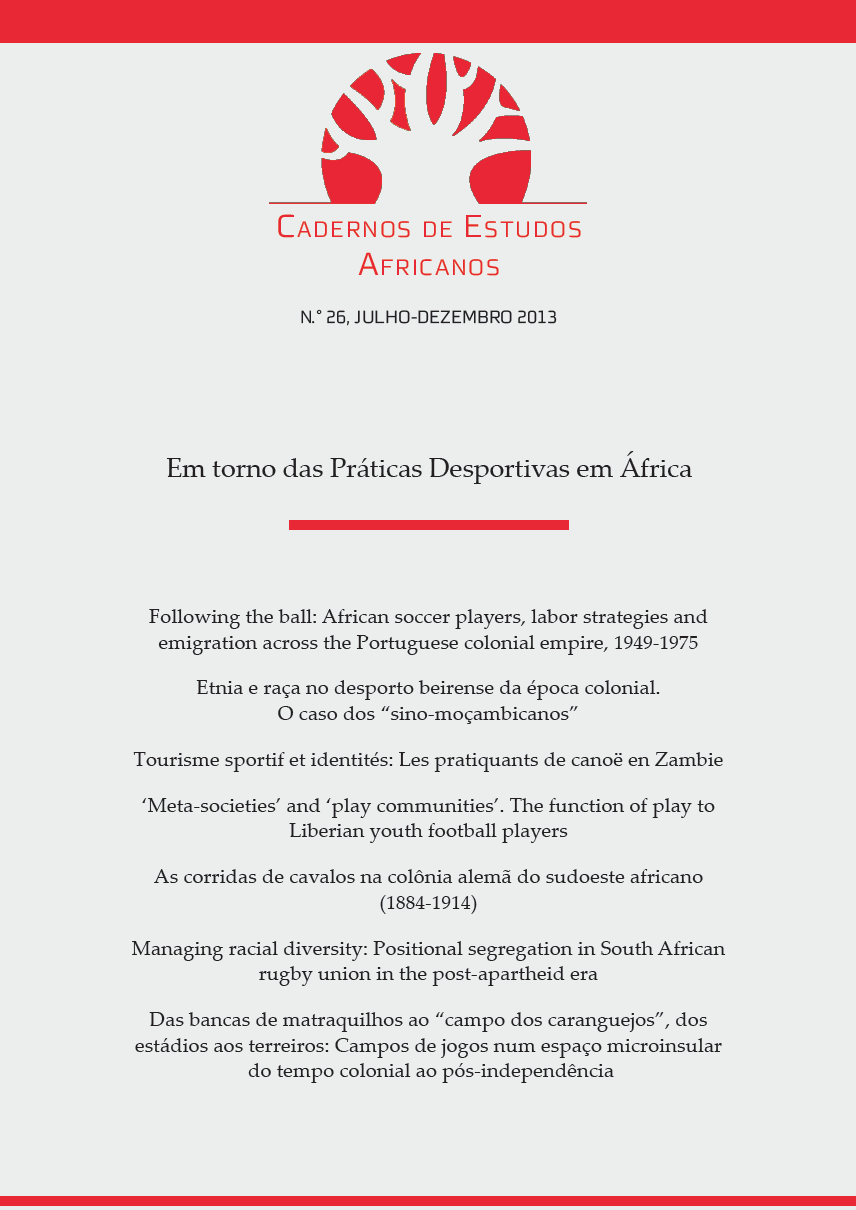Following the ball: African soccer players, labor strategies and emigration across the Portuguese colonial empire, 1949-1975
DOI:
https://doi.org/10.4000/cea.1109Palavras-chave:
Mozambique, Angola, immigration, Portugal, soccer, sportResumo
This article examines the experiences of African soccer players who relocated to Portugal from 1949 to the end of the colonial era in 1975, attempted to negotiate this politically-charged environment and strove to consolidate their post-athletic futures. I argue that despite the otherwise extraordinary nature of these individuals’ lives, their experiences suggest strong continuities with, and affinities to, well-established African labor strategies, including seeking occupational advice from more senior employees (i.e., fellow players) and engaging in secondary migration in order to improve working and living conditions. The article also contends that the process of cultural assimilation that helped players adjust to their new surroundings commenced in the urban, “colonized spaces” of Africa and, thus, well before they arrived in Portugal.Referências
Aguiar, M. de. (1968). Coluna: O grande capitão. Lisboa: Filtro Estúdios Gráficos.
Alegi, P. (2004). Laduma!: Soccer, politics and society in South Africa. Scottsville, South Africa: University of KwaZulu-Natal Press.
Araújo: O “Ben Barek” de Sá da Bandeira. (1960, 18 March). ĺdolos do Desporto, Series 2, No. 23.
Armando: O “115” do Sporting. (1967, 30 December). ĺdolos do Desporto, Series 5, No. 1.
Armstrong, G. (2004). The migration of the black panther: An interview with Eusébio of Mozambique and Portugal. In Armstrong, G., & Giulianotti, R. (Eds.), Football in Africa: Conflict, conciliation and community (pp. 247-263). Basingstroke: Palgrave Macmillan.
Bender, G. (1978). Angola under the Portuguese: The myth and the reality. Berkeley, Los Angeles: University of California Press.
Calado: O “Papua” de Lourenço Marques. (1968, 24 February). ĺdolos do Desporto, Series 5, No. 9.
Choy, C. C. (2000). ‘Exported to care’: A transnational history of Filipino nurse migration to the United States. In Foner, N., Rumbaut, R. G., & Gold, S. J. (Eds.), Immigration research for a new century: Multidisciplinary perspectives (pp. 113-133). New York: Russell Sage Foundation.
Coelho, J. N., & Pinheiro, F. (2002). A paixão do povo: História do futebol em Portugal. Porto: Afrontamento.
Correia, F. (2006). Matateu: O oitava maravilha. Lisboa: Sete Caminhos.
Darby, P. (2007). African football labour migration to Portugal: Colonial and neo-colonial resource. Soccer & Society, 8 (4), 495-509.
DOI : 10.1080/14660970701440774
Dias, M., & Pinhão, C. (1990). Benfica: O voo da águia, Álbum 88/89. Porto: ASA.
Domingos, N. (2007). Football and colonialism, domination and appropriation: The Mozambican case. Soccer and Society, 8 (4), 478-494.
DOI : 10.1080/14660970701440758
Domingos, N. (2008). Football in colonial Lourenço Marques: Bodily practices and social rituals. Unpublished Ph.D. Thesis, School of Oriental and African Studies, University of London, London, England.
Ferreira, E. da S. (1967). My name is Eusébio (Derrik Low, Translated). London: Routledge & Kegan Paul.
Jacinto João: A “pérola negra” do Sado. (1969, 6 December). ĺdolos do Desporto, Series 6, No. 3.
José Maria: O “pulmão” do Vitória. (1969, 6 December). ĺdolos do Desporto, Series 6, No. 13.
Lanfranchi, P., & Taylor, M. (2001). Moving with the ball: The migration of professional footballers. Oxford: Berg.
Lanfranchi, P., & Wahl, A. (1996). The immigrant as hero: Kopa, Mekloufi and French football. In Holt, R., Mangan, J. A., & Lanfranchi, P. (Eds.), European heroes: Myth, identity, sport (pp. 114-125). London: Frank Cass.
DOI : 10.1080/09523369608713928
Magode, J. (2005). Pouvoir et réseaux sociaux au Mozambique: Appartenance, interactivité du social et du politique (1933-1994). Paris: Connaissances et Savoirs.
Matateu: Um nome que fica na história do futebol (1961, 24 February). ĺdolos do Desporto, Series 2, No. 72.
Rosa, A. (1961). Factos, nomes e números da história do clube de futebol “Os Belenenses”. Lisboa: Freitas & Freitas.
Santana: O “molengão” de Catumbela. (1960, 5 February). ĺdolos do Desporto, Series 2, No. 17.
Santos, A. (2004). Heróis desportivos: Estudo de caso sobre Eusébio: De corpo a ícone da nação. Lisboa: Instituto do Desporto de Portugal.
Silva, E. (1992). Eusébio: Pantera negra. Lisboa: Meribérica.
Stoddart, B. (1988). Sport, cultural imperialism, and colonial response in the British Empire. Comparative Studies in Society and History, 30 (4), 649-673.
DOI : 10.1017/S0010417500015474
Torres: O “jogador médico”. (1959, 21 November). ĺdolos do Desporto, Series 2, No. 6.
Wilson, M. (2011). Uma marca na história. In Santana, J., & Mesquita, J. (Eds.), Académica – História do futebol (pp. 512-513). Coimbra: Almedina.
Downloads
Publicado
Edição
Secção
Licença
Direitos de Autor (c) 2016 Cadernos de Estudos Africanos

Este trabalho encontra-se publicado com a Licença Internacional Creative Commons Atribuição-NãoComercial-CompartilhaIgual 4.0.
Autorizo a publicação do artigo/recensão submetido do qual sou autor.
Declaro ainda que o presente artigo é original, que não foi objecto de qualquer tipo de publicação, e cedo em exclusivo os direitos de publicação à revista Cadernos de Estudos Africanos. A reprodução do artigo, no todo ou em parte, noutras publicações ou noutros suportes depende de autorização prévia da editora Centro de Estudos Internacionais do Iscte - Instituto Universitário de Lisboa.

